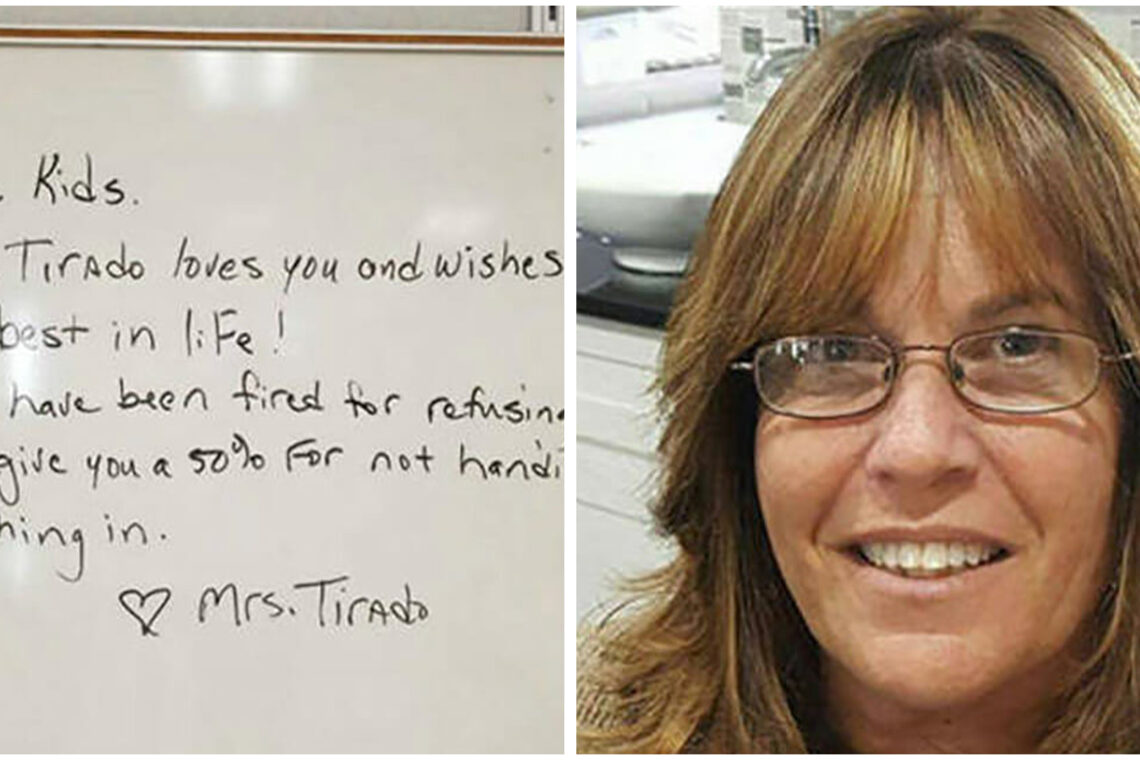
Teachers today carry immense responsibility in shaping the lives of their students. Beyond imparting knowledge, they are tasked with instilling values such as kindness and discipline, all while preparing children for a complex world. This vital role demands not just dedication but also the courage to uphold one’s principles, especially when faced with opposition.
In a recent incident that gained significant attention, a Florida teacher, Diane Tirado, found herself at the center of a controversy regarding her grading policies. With a wealth of experience in education, Diane was teaching eighth-grade history at Westgate K-8 School in Port St. Lucie. As part of her commitment to fostering accountability among her students, she adopted a strict grading approach: if students failed to submit their homework, they received a zero.
This policy, while rooted in her belief that grades should reflect the work completed, clashed with the school’s administration. The school insisted that Diane should assign a minimum grade of 50, regardless of whether the homework was submitted. This created a significant conflict between Diane’s educational philosophy and the administrative directives she was expected to follow.
Diane stood her ground, believing that allowing students to receive credit for incomplete work undermined their learning experience. She articulated her concerns, stating that in her view, simply showing up should not be rewarded without effort or accomplishment. This belief stemmed from a larger concern she had about current educational trends that she felt encouraged complacency among students. She worried that this mindset might lead to a generation of individuals who expected rewards without taking responsibility for their actions.
Despite her dedication and rationale, the school administration ultimately chose to terminate Diane’s employment. Following her dismissal, she expressed her feelings in a poignant farewell message to her students on the whiteboard. In it, she wrote, “Bye kids, Mrs. Tirado loves you and wishes you the best in life! I have been fired for refusing to give you a 50% for not handing anything in.” This heartfelt message encapsulated her commitment to her students and her stance on the importance of accountability in education.
However, the school administration took action by erasing her message. Undeterred, Diane rewrote it, took a photograph, and shared it publicly. Her decision to go public with her experience resonated with many, as she voiced her frustrations regarding the current state of education. Diane stated, “A grade in Mrs. Tirado’s class is earned,” emphasizing her belief in the value of hard work and integrity in academic performance.
Diane’s story quickly gained traction on social media, leading to widespread discussion and support for her views. Many commenters echoed her sentiments, arguing that it was unjust to assign grades to students who had not completed the necessary work. They believed that education should emphasize the importance of effort and achievement, rather than lowering standards to accommodate those who do not fulfill their responsibilities.
In reflecting on her experience, Diane remarked, “The reason I took on this fight was because it was ridiculous. Teaching should not be this hard.” Her words highlight the challenges that many educators face when trying to balance their teaching philosophies with administrative policies.
In contrast, the school district disputed Diane’s claims about her firing, asserting that her termination was not solely related to her grading policy but rather a result of what they described as “substandard” performance. This added another layer of complexity to the situation, raising questions about accountability not only for students but also for educators within the system.
Diane’s experience is not unique. There have been other instances where teachers faced backlash for adhering to strict grading standards. A notable case involved another educator, Lynden Dorval, who successfully challenged her dismissal after implementing a similar grading policy. This precedent underscores a growing dialogue about educational integrity and the responsibilities of both teachers and students.
The situation invites deeper reflection on the purpose of education. Are grades merely a reflection of knowledge acquired, or do they also serve to teach essential life skills such as responsibility, resilience, and the understanding that effort is required to achieve success? Diane Tirado’s story serves as a catalyst for this important conversation, emphasizing the need for educators to be empowered to uphold their values and beliefs in the classroom.
As we consider the implications of Diane’s experience, it is clear that the role of a teacher extends far beyond mere instruction. It encompasses the duty to prepare students for the realities of life, instilling in them the understanding that achievement is earned and that accountability is a vital component of success. This is a lesson that transcends the classroom, equipping students with the tools they need to navigate the world ahead.
In conclusion, Diane Tirado’s situation highlights the challenges educators face in upholding their principles in the face of administrative pressure. Her commitment to her students and her belief in the importance of accountability serve as a reminder of the vital role teachers play in shaping the future. As discussions around educational standards continue, it is crucial to consider the impact of grading policies on students’ understanding of hard work and achievement, ensuring that the values instilled in the classroom resonate well beyond the school walls.